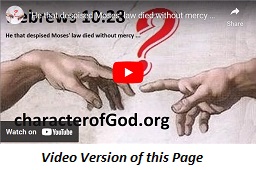Matthew 10:28 – Fear Him Which is Able to Destroy
Matthew 10:28 Meaning – Fear Him Which is Able to Destroy
 “And fear not them which kill the body, but are not able to kill the soul: but rather fear him which is able to destroy both soul and body in hell.” (Matt 10:28)
“And fear not them which kill the body, but are not able to kill the soul: but rather fear him which is able to destroy both soul and body in hell.” (Matt 10:28)
Interlinear versions show that the “him” in verse 28 is not in the original but is added. The original word “ho” (Strong’s G3588) is most often translated simply as “which” but, in this verse, the KJV rendered it as “him which.” However, the KJV also translates it as “things which” in Matt 15:18, 20 and 22:21. Putting that wording together with Romans 6:23 “the wages of sin is death” it could well have been translated: “fear those things – sins – which are able to destroy …”
It must be admitted that to say Matthew 10:28 points to God as the one doing the destroying is an assumption. People read that into the verse because, for most, that is the traditional understanding. But it does not say that. So who or what else could be responsible?
Sin as the Source of Death
There are a number of verses which point to sin as the cause of death. Here are a few examples:
“Evil shall slay the wicked: and they that hate the righteous shall be desolate.” (Psa 34:21)
“For the wages of sin is death; but the gift of God is eternal life through Jesus Christ our Lord.” (Rom 6:23)
“Then when lust hath conceived, it bringeth forth sin: and sin, when it is finished, bringeth forth death.” (James 1:15)
See more examples of such verses. Jesus could have been saying, essentially, “sin leads to death; don’t go down that road.”
The Devil as the Source of Death
It is the devil that has the power of death:
“Forasmuch then as the children are partakers of flesh and blood, he also himself likewise took part of the same; that through death he might destroy him that had the power of death, that is, the devil;” (Heb 2:14)
Lest that verse be taken to mean that God will, in the end, kill the devil, consider:
“Thou hast defiled thy sanctuaries by the multitude of thine iniquities, by the iniquity of thy traffick; therefore will I bring forth a fire from the midst of thee, it shall devour thee, and I will bring thee to ashes upon the earth in the sight of all them that behold thee.” (Eze 28:18)
See my e-book The Lake of Fire and the Second Death for a study of how the lost and the devil himself will encounter the second death. While God brings people to the final judgement scene, the Lake of Fire experience is not God killing the lost. Death was never meant to be a part of God’s creation. If it was, God would be the author and source of death. Rather, death is an enemy of both God and man:
“The last enemy that shall be destroyed is death.” (1 Cor 15:26)
It would seem strange indeed if God destroyed or put a final end to death by Himself inflicting it.
God is the Source of Only Life
Rather than being a source of death, God is the source of life:
“In him was life; and the life was the light of men.” (John 1:4)
Life and light are equated. In God there is no darkness and no death:
“This then is the message which we have heard of him, and declare unto you, that God is light, and in him is no darkness at all.” (1 John 1:5)
Matthew 10:28 Meaning – No Need to be Afraid of God
The following verses strongly suggest that there is no reason to be afraid of God:
“Are not two sparrows sold for a farthing? and one of them shall not fall on the ground without your Father. But the very hairs of your head are all numbered. Fear ye not therefore, ye are of more value than many sparrows.” (Matt 10:29-31)
God values the life of even the sparrows and the life of a human is of far more value to God. When He says “fear ye not” He is not contradicting Matthew 10:28. He is saying, I believe, “don’t fear Me; you are of great value to Me.”
“Fear” is often used in the sense of respect and the meaning in any verse must be determined from the context. Both uses of “fear” in Matthew 10:28 can be understood in the sense of “to be afraid of” as the fear, in both cases, is of a source of death.
Watch a video of a group study of this page:
Return from Matthew 10:28 Meaning to the Home Page

November 13, 2018 @ 4:06 pm
If we must retain the “him” in the passage, then it has to be referring to the sinner himself (or herself). We have only ourselves to fear, that we stubbornly resist God and choose death.
November 14, 2018 @ 7:32 am
Excellant article, and great additional comment too!
And I highly recommend The Remedy Bible by Dr Timothy Jennings. (New Testament)
Book or app.